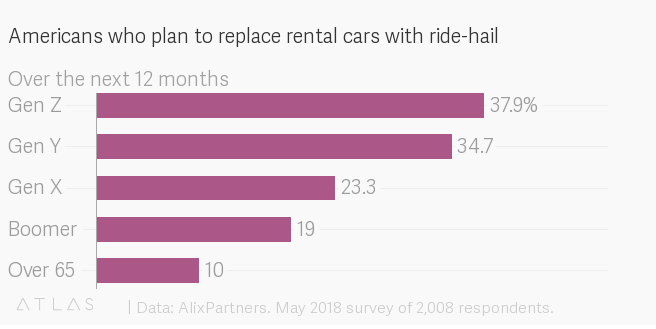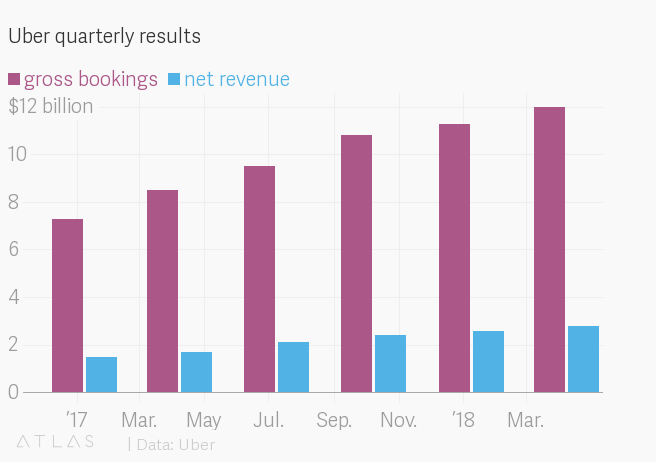Hello and welcome to Oversharing, a newsletter about the proverbial sharing economy. If you're returning from last week, thanks! If you're new, nice to have you! (Over)share the love and tell your friends to sign up here. (I was told people missed this weekly greeting, so here it is, enjoy.)
Programming note: Oversharing is on vacation next week. Also, I am moderating a panel tonight on “the future of workers and the gig economy.” Swing by if you’re around.
SoftBank.
Peer-to-peer car rental app Getaround has raised $300 million led by everyone’s favorite wealthy benefactor, SoftBank. That brings its total funding to nearly $400 million, at an undisclosed valuation.
Getaround is one of two main startups, along with Turo, working to make car-“sharing” a popular alternative to owning a car or a traditional car rental. Getaround lets users find and unlock someone else’s car from an app, with rentals starting at $5 an hour.
It previously raised money from investors including Toyota, and has a deal with Uber to let Uber users find and rent a Getaround vehicle through the Uber app. Turo has raised $216 million to date.
SoftBank is already the king of ride-hailing. It’s invested in Uber, India’s Ola, Singapore’s Grab, China’s Didi Chuxing, and Brazil’s 99 (which was later acquired by Didi). Zaid has said he believes car-sharing can complement ride-hailing to meet “most of a person’s transportation needs.”
SoftBank seems to agree. The Japanese tech giant is getting in as US consumers sour on traditional rental cars. In May, consulting firm AlixPartners surveyed 2,008 respondents who had rented a motor vehicle in the last 12 months. It found that 35% agreed that renting a car was a “laborious process” and 34% felt add-on charges were too high. Ten percent wanted to rent directly from an app.
More damningly, AlixPartners found that 35% of traditional car-rental customers had used ride-hail in place of car rental in the last 12 months, and of those, 21% had replaced more than half their trips. Millennials and Gen Z are particularly keen on switching from rental to ride-hailing.

Scooters.
It is not all fun and games:
The 21-year-old woman who died late Saturday after she was hit by a car while riding an electric scooter in downtown Cleveland was the first reported death on an electric kick scooter nationwide.
The woman was reportedly struck from behind by a Chevrolet Cruze driven by a 19-year-old man, likely under the influence. Police haven’t said what brand of scooter was involved in the crash. Bird deployed about 100 electric scooters in three Cleveland neighborhoods on Aug. 10, which the city immediately asked it to remove. Following the woman’s death on Aug. 19, Cleveland State University sent a campus-wide email banning Bird scooters from school property.
Other scooter riders are breaking bones, getting black eyes, and losing teeth as they zip around town, usually without helmets:
“We are seeing daily injuries from users of the motorized scooters,” Dr. Wally Ghurabi, medical director of the Nethercutt Emergency Center at UCLA Medical Center in Santa Monica, CA. told BuzzFeed News, “As well as some injuries to pedestrians who were hit by riders or tripped over scooters left on sidewalks.” In nearby Venice, CA Venice Urgent Care confirmed they get “a lot” of people with scooter injuries.
StreetsBlog argues that scooters aren’t to blame—“dangerous streets designed only for cars are.” The New York Times editorial board took a similar stance over the weekend, arguing scooters could be a boon to New York City, if local officials get more serious about protected bike lanes. “Bird has pledged to help pay for such improvements… promising city governments $1 a day per vehicle on their streets,” the editorial board writes. “It’s an offer New York shouldn’t refuse, and other scooter and bike rental firms should pony up funds, too.”
Meanwhile, scooter injuries were also a hot topic in the First Scooter Boom. Here is ABC News from September 2000:
The number of scooter-related injuries has surged this summer, with more than 4,000 in August alone compared with fewer than 500 in May, the Consumer Product Safety Commission said today. Children younger than 15 account for nearly nine out of 10 injuries.
“These are certainly not your grandmother’s scooters from the 50’s,” Ann Brown, the safety commission’s chairwoman, said in an interview. “Many kids are ending up in hospital emergency rooms instead of classrooms.”
At the time, the Consumer Product Safety Commission encouraged scooter riders to invest in the same gear as rollerbladers: helmets, wrist guards, and elbow and knee pads. They might not have been grandma’s from the 50’s, but they also weren’t electric.
The driverless future?
Uber’s gross bookings and revenue rose in the second quarter of 2018, a good sign for those who feared Dara Khosrowshahi would be unable to maintain the company’s fearsome pace of growth while also making nice with drivers and regulators around the world. Bookings, which include demand for rides and delivery services like UberEats, rose 41% year-on-year to $12 billion. Revenue jumped 63% over the previous year, to $2.8 billion.

Notably absent from that description of the future: driverless cars. The future of Uber’s most futuristic endeavor has been uncertain since Khosrowshahi took over nearly a year ago, when he reportedly considered shuttering the driverless program altogether. More recently, Uber’s CEO had been impressed by progress in the autonomous unit, until an Uber car struck and killed a pedestrian in Tempe, Arizona, on March 18.
The company is now divided over what to do about the Advanced Technologies Group, the New York Times reported, with one faction pushing for a partnership or sale of the unit, while another wants Uber to keep investing in it. Losses on self-driving technology have mounted, with Uber spending $125 million to $200 million a quarter on the unit, or 15% to 30% of its quarterly loss, per the Information. Uber is under pressure to cut losses ahead of a potential public offering in 2019.
Airbnbait and switch.
Imagine you look at a unit in a luxury apartment complex. The building is still under construction, but it’s marketed to young creative people, and a little bit of construction isn’t that bad, all things considered. You read the lease and see that Airbnb is prohibited. You breath a sigh of relief. No travelers traipsing through your building at all hours. You sign the lease.
Now imagine that, a few months into your lease, a document is slipped under your door. It says the “rent process will change” and a new company has “taken over management responsibilities.” You start to feel concerned. The next day you get an email from the new owner. You read it once, twice. It says your building “will be the first Niido | Powered by Airbnb community in the world to officially open.” It says you’ll get a coffee bar.
You might feel a bit like Ruth Gonzalez, who was shocked to learn earlier this month that her home in the Olmsted in Nashville would be converted into America’s foremost Airbnb theme park:
“There’s no direction that a CMO or marketing executive could spin this for me that this hybrid apartment-hotel that hasn’t been tested is safe,” Gonzalez said. “My safety concerns cannot be assuaged by a marketer. This is an untested hybrid model and I don’t want to be the guinea pig for that. I don’t want to pay my rent while they figure out how to make this model work.”
When Airbnb announced its partnership with Newgard Development Group to create Airbnb-friendly properties in October 2017, it said they would collaborate on “new apartment buildings that will be optimized for home sharing and flexible living.” What wasn’t clear was that Airbnb and Newgard could get these complexes not by building new units but by staging takeovers of existing communities that might not want to live in Airbnb-optimized housing. Or that they would try to wash down the bad news with free coffee bars.
To quote Michelle Bellamoré, “The whole reason I chose the Olmsted was because they had the complete opposite business model as Niido.”
Other stuff.
Ford in no rush to deploy driverless cars. DoorDash raises $250 million at $4 billion valuation. Cargomatic gets $35 million for Uber-for-freight business. Uber pushes further into East Africa. London mayor wants to cap Uber. Tesla hires Uber employees accused of spying. San Francisco dings Uber and Lyft during scooter permitting. Nuro launches grocery delivery with driverless cars in Arizona. Ola funds scooter startup in Bengaluru. WeWork leases 260,000 square feet at Penn Plaza. To have and to super-have. Soda is over. There are more active Pokemon Go players than Uber users. What If a Female CEO Acted Like Elon Musk?



